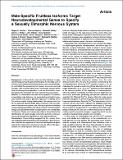Male-specific fruitless isoforms target neurodevelopmental genes to specify a sexually dimorphic nervous system
View/
Date
03/02/2014Author
Funder
Grant ID
NE/J020818/1
Keywords
Metadata
Show full item recordAbstract
Background In Drosophila, male courtship behavior is regulated in large part by the gene fruitless (fru). fru encodes a set of putative transcription factors that promote male sexual behavior by controlling the development of sexually dimorphic neuronal circuitry. Little is known about how Fru proteins function at the level of transcriptional regulation or the role that isoform diversity plays in the formation of a male-specific nervous system. Results To characterize the roles of sex-specific Fru isoforms in specifying male behavior, we generated novel isoform-specific mutants and used a genomic approach to identify direct Fru isoform targets during development. We demonstrate that all Fru isoforms directly target genes involved in the development of the nervous system, with individual isoforms exhibiting unique binding specificities. We observe that fru behavioral phenotypes are specified by either a single isoform or a combination of isoforms. Finally, we illustrate the utility of these data for the identification of novel sexually dimorphic genomic enhancers and novel downstream regulators of male sexual behavior. Conclusions These findings suggest that Fru isoform diversity facilitates both redundancy and specificity in gene expression, and that the regulation of neuronal developmental genes may be the most ancient and conserved role of fru in the specification of a male-specific nervous system.
Citation
Neville , M C , Nojima , T , Ashley , E , Parker , D J , Walker , J , Southall , T , Van de Sande , B , Marques , A C , Fischer , B , Brand , A H , Russell , S , Ritchie , M G , Aerts , S & Goodwin , S F 2014 , ' Male-specific fruitless isoforms target neurodevelopmental genes to specify a sexually dimorphic nervous system ' , Current Biology , vol. 24 , no. 3 , pp. 229-241 . https://doi.org/10.1016/j.cub.2013.11.035
Publication
Current Biology
Status
Peer reviewed
ISSN
0960-9822Type
Journal article
Description
This work was supported by grants from the Wellcome Trust to S.F.G. (WT085521MA and WT082987MF) and the Natural Environment Research Council to S.F.G and M.G.R. (NE/J023647/1). J.W. and E.A were supported by Biotechnology and Biological Sciences Research Council Committee studentships.Collections
Items in the St Andrews Research Repository are protected by copyright, with all rights reserved, unless otherwise indicated.

